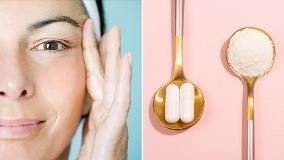What is collagen?
Collagen, the most abundant structural protein found in mammals, is the primary fibrous component of skin, bones, and teeth. As a matter of fact, it forms 30% of the total protein content in the body (by weight). Collagen is synthesized in distinct cells known as fibroblasts as a large precursor, also known as procollagen, which is further transformed into collagen. Ascorbic acid (Vitamin C) plays a very important role in its formation.
The skin and collagen: how this protein changes as we age
Of the 19 types of collagen, type I is the amplest, found in the skin, tendons, and blood vessels. Collagen aids to hold together the cells in various tissues and equips the skin with high tensile strength. Collagen is equally crucial in maintaining the firmness, elasticity and moisture content of your skin. Owing to its tough fibrous structure, it manages the signs of ageing, repairs skin damage as well as scars, and gives the skin a smooth appearance. This ability of collagen to work as a fireball constituent peaks in the second and third decade of life, and sadly dips thereafter. This is induced by the decreased activity of fibroblasts throughout the years (aggravated by various stresses mentioned above). With age, your skin’s ability to replenish collagen decreases by about 1.5% per year. Surprisingly, women can lose up to 30% collagen within the 5 years of hitting menopause.
Is damage caused by depletion of collagen reversible?
The age-dependent decline is favoured by various factors such as the infamous UV radiation, environmental aggressors, stress, and smoking, a sudden change in the environment, hormones, and nutritional deficiencies. Thus, with advancing age and decreasing collagen levels, we start noticing increased fine lines and wrinkles. Nevertheless, numerous research papers point towards the fact that these signs of ageing can be reversed via four methods- a. Increased production, b. Decreased degradation c. surgical treatments d. topical treatments, and e. oral supplementation of collagen. By far, oral supplementation and topical treatment stay the most popular approaches to increase collagen level in the skin and thus improve its appearance.
Topical collagen vs oral supplements- which is better
Even though the easiest way to deliver any drug (or cosmetic) into the body is a local application, don’t fall into the belief that topical products (like moisturizers) that contain collagen (or “hydrolysed collagen, as is listed in the ingredients of many products) will do any good to your skin. A characteristic collagen fibril is helical in structure (similar to a braid), and this structure is too big to actually penetrate into your skin and reach the deeper layers (specifically the dermis). Even though such creams may hydrate your skin, you are far from getting the benefits of collagen. The benefits of hydrolysed collagen have not been tested in the human skin.
On the other side, there is surplus research (11 pieces of research conducted in about 805 subjects to be precise) that confirm the benefits of oral supplements of collagen towards improving skin appearance, especially in women over 35 years of age. These supplements are available as bioactive short-chain collagen peptides. In one such research carried out in Germany, researchers concluded that women (over 35 years of age) who use collagen supplements for a period of 12 weeks noted improved skin elasticity and hydration by almost 40%.
Thus, oral supplements of collagen undoubtedly have the upper hand to regenerate skin. These are safe, and well-tolerated by almost all recipients throughout the period of intake.
Other products that increase collagen in the skin
- Vitamin C is very critical in the synthesis of collagen, as it serves as a cofactor for two important enzymes (prolyl and lysyl hydroxylase) that stabilize collagen fibres. Vitamin C also acts directly on the DNA and increases the synthesis of Type I and Type III collagen.
2. Zinc, another cofactor in the biosynthesis of collagen, is clearly essential to repair as well as protect collagen from damage. It is abundant in pumpkin seeds, cashews, and cacao.
3. Bone broth, citrus fruits, berries, and white tea- these are some food sources of collagen that help to augment the level of collagen in the body.


